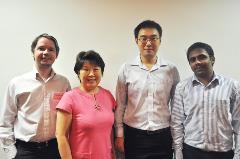It is not often that students get to work on projects of national significance, but that was what two ISS Graduate Diploma in Systems Analysis interns did when they developed the official mobile app for this year’s National Day Parade (NDP).
For Kyle Sun Jiakung and Annam Badrinarayana Nagaraj (Raj), the opportunity came when they were undergoing their internship with mobile and web solutions provider, Massive Infinity (MI). Established in 2011, Massive Infinity helps companies take advantage of innovative solutions that leverage mobile, web and state-of-the-art technologies such as Augmented Reality, Quick Response (QR) coding, GPS tracking and e-commerce.
Since its inception, the company has been a strong supporter of the ISS internship programme. The 20-week attachment is a mandatory requirement for the Graduate Diploma in Systems Analysis (Dip SA) course, which is designed for IT graduates to advance their careers and for non-IT graduates to enter the IT industry. The internship complements the lectures, workshops, laboratory sessions and projects by providing students with exposure to real-life situations in IT development.
Under the supervision of Massive Infinity’s general manager Kristopher Heslop, lead Android developer Zhao Jin and lead designer Gerald Ng, the two ISS interns had to design, develop and deploy new features for the Official NDP 2013 Mobile App on iOS and Android platforms.
The aim of the app was to bring NDP 2013 closer to Singaporeans by delivering bite-sized information about NDP in a convenient and accessible format and allowing users to apply for NDP tickets, access NDPeeps Facebook, photos and videos. Since its launch, the NDP 2013 Mobile App hit number one on the Singapore AppStore and received a 4-star rating from users.
The ISS programme helped prepare the students for the internship in many ways, said Kyle. “The first was how to communicate with other developers because you should be able to explain to the others what you want or understand what it is that the user wants,” he said. The second was to develop good practices in programming, for example, making annotations whenever code is changed so that other developers can understand the programming logic.
The third important area was the development of learning skills. At ISS, the actual time spent studying was relatively short compared to the things that the students had to learn, so it was important to be able to make full use of every moment to learn, said Kyle.
Over the course of the internship, the ISS students had the opportunity to make use of what they had learnt about software and agile development methodology and practices, and apply their knowledge and newly acquired skills in actual work situations, with all the inherent obstacles and challenges.
For example, with five months to develop the app, one of the challenges that the students faced was to work within a tight deadline. This brought home the importance of collaboration and teamwork. For the NDP project, the interns focused on creating the Android application and later Kyle helped to develop the user interface and built the mobile app for the iOS platform while Raj worked on the backend development which was created in PHP. “I really learnt the importance of working as a team,” said Raj.
Another key benefit of the internship programme was the exposure to newer technologies in Android and iOS development as well as the Windows Azure cloud platform. The technologies involved in the deployment of the NDP app on Azure included Google Cloud Messaging for push notification, REST using PHP/JSON, APIs to YouTube/Facebook, Design Structures to manage memory, Objective-C for IOS, Java for Android, and GIT for source-control.
From ISS’s perspective, the internship programme plays an important role in reinforcing the students’ skills in Systems Analysis. For each attachment, the students are carefully matched with a suitable company in terms of its work culture, practices and goals. For example, the company must have a methodology in place to support software development, encourage resourcefulness and exploration, and be committed to mentoring the students.

From left: Kristopher Heslop, General Manager, Massive Infinity; Gloria Ng, Evangelist of Service Innovation Practice, NUS-ISS; Kyle Sun Jiakung; Annam Badrinarayana Nagaraj (Raj)
Gloria Ng, Evangelist of Service Innovation Practice at ISS, was the mentor to Kyle and Raj for their internship. She noted that exemplary human resource practices at Massive Infinity helped create a nurturing environment for the interns to exercise their creativity and come up with innovative approaches to solving technical challenges.
“Our students were able to work with different technologies although they were only vaguely familiar with them at the beginning of the internship,” she observed. “They were encouraged to experiment – discover, learn, trial and implement continuously throughout their project. Even the students were awed by what they were capable of, given their initial apprehension at the start of their internship.”
For Massive Infinity, the collaboration with ISS has also been a win-win arrangement, which allows the company to work with a steady stream of young talents on its projects. “The quality is there as the ISS interns have the base competencies which enable them to quickly learn new skills” Kristopher said of the ISS interns. “We are always happy to be part of the ISS programme.”
It also helps that the Massive Infinity team is close-knit, and the ISS interns have been able to get accustomed to the culture easily, said Kristopher. In fact, many of them go on to join the company on a more permanent basis when they graduate from their course, resulting in an expanding ISS family within its ranks.
Kyle, for example, is currently working as a mobile developer with the company. “The environment here is relaxed, allowing us to focus on delivering the solutions,” he said. “We all work very hard and communicate well. Most importantly, the management takes in all our suggestions seriously, even the interns.”
To find out more about the ISS internship programme, click here
This article is first published in NUS-ISS quarterly e-newsletter, Issue 4 (Oct-Dec 2013).